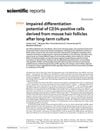 6 citations,
April 2010 in “Cellular Reprogramming”
6 citations,
April 2010 in “Cellular Reprogramming” Pig skin cells can turn into mesodermal cells but lose their ability to become neural cells.
 138 citations,
November 2015 in “Journal of Pharmacology and Experimental Therapeutics”
138 citations,
November 2015 in “Journal of Pharmacology and Experimental Therapeutics” Protoporphyrin IX is useful in cancer treatment but can cause health problems if not properly regulated.
15 citations,
January 2023 in “Antioxidants” Oxidative stress plays a significant role in alopecia areata, and new treatments may include JAK inhibitors and antioxidants.
 1 citations,
January 2017 in “Tohoku journal of experimental medicine”
1 citations,
January 2017 in “Tohoku journal of experimental medicine” A woman's mature cystic teratoma caused her virilization by producing testosterone.
276 citations,
April 2003 in “Molecular endocrinology” Vitamin D is important for bones, hair, blood pressure, and breast development.
 October 2024 in “Frontiers in Pharmacology”
October 2024 in “Frontiers in Pharmacology” Genetic variants can affect valproic acid's effectiveness, side effects, and levels in epilepsy treatment.
 3 citations,
April 2022 in “Frontiers in Physiology”
3 citations,
April 2022 in “Frontiers in Physiology” Ptch2 plays a key role in controlling stem cell function and the ability to regenerate after birth.
26 citations,
September 2012 in “Cell Reports” B-Raf and C-Raf are essential for maintaining melanocyte stem cells to prevent hair graying.
 133 citations,
September 2013 in “Nature Reviews Molecular Cell Biology”
133 citations,
September 2013 in “Nature Reviews Molecular Cell Biology” Different types of stem cells and their environments are key to skin repair and maintenance.
February 2017 in “The Journal of urology/The journal of urology” Castration significantly reduces prostate size and BPH symptoms.
 5 citations,
June 2020 in “Experimental dermatology”
5 citations,
June 2020 in “Experimental dermatology” Redheaded people may have evolved to efficiently make vitamin D in areas with less sunlight.
 1 citations,
November 2023 in “iScience”
1 citations,
November 2023 in “iScience” A protein called desmoglein 3 is important for keeping hair follicle stem cells inactive and helps in their regeneration.
 132 citations,
January 2017 in “International Journal of Molecular Sciences”
132 citations,
January 2017 in “International Journal of Molecular Sciences” Fat-derived stem cells show promise for skin repair and reducing aging signs but need more research for consistent results.
 December 2012 in “Journal of dermatological science”
December 2012 in “Journal of dermatological science” Langerhans cells and melanocytes migrate to the skin and hair follicles during early human development.
 4 citations,
January 2013 in “Humana Press eBooks”
4 citations,
January 2013 in “Humana Press eBooks” Scientists found ways to identify and collect skin stem cells, which vary by skin area and are delicate.
 5 citations,
June 2021 in “Pharmacological Reports”
5 citations,
June 2021 in “Pharmacological Reports” Vitamin D may help reduce antibody levels in men with autoimmune thyroiditis and early-onset androgenic alopecia, but has no significant impact on thyroid function.
23 citations,
October 2009 in “Gastroenterology” Vitamin D is crucial for bone health and preventing serious diseases.
 1 citations,
September 2023 in “Life science alliance”
1 citations,
September 2023 in “Life science alliance” Vitamin D Receptor is crucial for hair follicle shrinkage and cell death, affecting hair growth.
2 citations,
January 2017 in “Case reports in endocrinology” Ashwagandha root improved symptoms of nonclassic 11-hydroxylase deficiency in an elderly woman.
 4 citations,
December 2021 in “The journal of investigative dermatology/Journal of investigative dermatology”
4 citations,
December 2021 in “The journal of investigative dermatology/Journal of investigative dermatology” Overactive Wnt signaling in mouse skin stem cells causes acne-like cysts and shrinking oil glands, which some treatments can partially fix.
15 citations,
June 2020 in “The journal of investigative dermatology/Journal of investigative dermatology” Mice with extra human KLK14 had hair and skin problems, including weaker cell bonds and inflammation, linked to Netherton syndrome.
 2 citations,
June 2022 in “Scientific reports”
2 citations,
June 2022 in “Scientific reports” Mouse hair follicle stem cells lose their ability to change into different cell types after being grown for a long time.
 16 citations,
May 2019 in “Hormone and Metabolic Research”
16 citations,
May 2019 in “Hormone and Metabolic Research” Selenium might help with insulin resistance and cholesterol in PCOS, but more research is needed to confirm its benefits.
 1 citations,
March 2024 in “Science”
1 citations,
March 2024 in “Science” Vitamin A helps skin stem cells decide their function, aiding in hair growth and wound repair.
128 citations,
August 2020 in “Cell stem cell” Dermal fibroblasts have adjustable roles in wound healing, with specific cells promoting regeneration or scar formation.
 June 2024 in “Synthetic and systems biotechnology”
June 2024 in “Synthetic and systems biotechnology” A fragment of human type XVII collagen shows great potential for skin health and wound healing.
 10 citations,
June 2016 in “Wound Repair and Regeneration”
10 citations,
June 2016 in “Wound Repair and Regeneration” The microenvironment, especially mechanical forces, plays a crucial role in hair growth and could lead to new treatments for hair loss.
 12 citations,
March 2022 in “Frontiers in Nutrition”
12 citations,
March 2022 in “Frontiers in Nutrition” Obesity is linked to various skin conditions and issues, and losing weight can improve these conditions.
 February 2020 in “İstanbul medical journal”
February 2020 in “İstanbul medical journal” Metformin improves early signs of heart disease in women with PCOS and raises apelin levels, but doesn't significantly change artery thickness.
 15 citations,
July 2017 in “Hormones”
15 citations,
July 2017 in “Hormones” Genetic defects in the glucocorticoid receptor gene can cause conditions with abnormal sensitivity to stress hormones, and other factors may also affect this sensitivity.






















